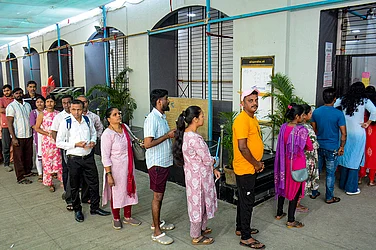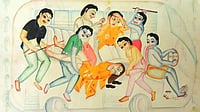It was Gauri Shinde’s English Vinglish in 2012 that first threw light on how inferior India can make non-English speakers feel. The docile, home chef Shashi Godbole (played by Sridevi), whose laddoos are the talk of the town, is constantly belittled by her daughter and husband for her ignorance to communicate in the global lingua franca.
After a waitress was rude to her at a café in New York that she was visiting to help organise her niece’s wedding, she decides to learn English and using her earnings from her laddoo business, takes up lessons in secret. Finally at the wedding, she delivers a deeply moving toast in English, composed of simple, short sentences where she advises young couple to treat each equally and find their own strength at times when one feels under appreciated by the other. Her fluency in the language shocks her daughter and husband who later make up for their years of otherising her.
Shinde made the movie as an ode to her mother, who ran a successful pickle-making home business, but always felt unequal in the eyes of society for her inability to communicate in English.
English Vinglish summarises why the language is being furiously lapped up in India. The main reason: English is equated to being modern, and therefore acceptability in the ‘modern society’ means a superior command over English. People experiencing this train of thought are usually the ones hailing from small towns who studied in vernacular medium schools where English was either not taught, or was an optional subject or was just in theory such that they can write in the language but clam up when it comes to speaking it. Such aspirants feel that by learning English, they can avail of better job opportunities and lead quality lives like their English-speaking counterparts.
Then there are others, from the 40 and above age group, who experience a far more brutal generation gap with young family members because of the English language barrier. And catering to all such needs and masses, the English classes too broadly range from one in your gully with signboards of smart-looking professionals who are usually white-skinned talking into a headset to the ones by top institutes like British Council.
Aruna Arora started Language Garden in 2018 that also teaches other international languages, after years of seeing her mother, a homemaker, struggle with the language. Arora says, "She can understand English but is scared to communicate in it. But she wanted me to be confident in English and would even issue a fine when I didn’t. Seeing her, I wanted homemakers to get rid of their inhibitions around the language and talk freely.”
At present, the English classes cater to people between eight to 60 years old. Eight to 12-year-olds are enrolled in the course by parents who want them to receive a strong foundation and steps ahead of what the school is teaching them. The 16 to 30-year-olds come in solely to better career prospects. This group is the most diverse, where online batches see students even from Central India like Madhya Pradesh and North-eastern states like Meghalaya.
During lockdowns, Arora found a noticeable increase in the number of students for the English-speaking course. Arora says, “They wanted to use this time to work on themselves.” Arora further plans to include class outings in the physical format where students are taken to a café, library, airport, and other public spaces. Arora adds, “They get the chance to live out the real-life situations and practice speaking their heart out in English.”
Mainly the students come out of the want for better jobs, but not always. Arora says, “We have two grandmothers, both sisters, who studied in Hindi and now want to communicate with their grandkids. There are also many Class XII girls wanting to learn to communicate in everyday situations like at a college event or a restaurant. This includes, asking for the menu, inquiring about a dish, placing an order, or even asking for a new fork if they accidentally dropped theirs. There’s a lot of discrimination if you don’t know English. People who come to learn English feel they are losing out and want better lives, and who are we to stop them from dreaming? You don’t become modern by dressing up or using English, but by your thought process.”
While an English course at Language Garden costs Rs 15,000 per level, students availing the Speak India project by Agilo Foundation struggle to cough up even Rs 500 per month for a three-month introductory course in English, says President Vijay Sharma. Most of the course’s students’ hail from low-income backgrounds as the organisation is in Palam Village near Dwarka in Delhi, a slum area surrounded by close to 10 villages.
Sharma says, “About 15-20 years ago, being computer-literate was the main job requirement, but today it is the ability to write and communicate in English. This is why most students enrol for our classes even though they live on rent with their families and this course is an additional cost. We used to get CSR funding before the pandemic and even tie-ups with the British Council. Right now, even the students are few due to the Class XII board exams.”
At present, there are three ongoing batches of 15 students.
“All the documentation forms are in English, despite the whole talk of Hindi being the matrabhasha. That’s when I feel inferior,” says Sadhana, who is pursuing her Hindi Honours, and is currently doing the Speak India course at Agilo. Sadhana adds, “A friend, who had done this course, gave it glowing reviews and that is why I joined it. They teach English in such a simple manner that I don’t feel scared or low in any way. I learnt English in school, but we were not taught how to be conversant. So, this course was a blessing, and even the fee felt nominal.”
Despite recognising the importance English holds, Sharma lauds the Bharatiya Janata Party (BJP) government’s nation-wide push for Hindi with the ‘One Nation, One Language’ policy, which leaves English optional. He recalls a visit to Chennai, where he couldn’t speak the regional language and people there couldn’t speak in English or even Hindi.
He says, “If we are living in India, Hindustan, then everyone should learn Hindi. Otherwise, there is a partition within the country itself. English is just a need, an international language, which has become mandatory, but Hindi is our sankruti, we must learn it.”
Arora, however, feels that this policy is impossible to implement in a country like India, with diverse languages, dialects, and mother tongues. Arora says, “We are known for our rich culture and heritage. Punjabi in Punjab is different from the Punjabi in Haryana. Or Hindi is different in Delhi and Mumbai. Either all languages should be given equal importance, or none should be given more importance than the other.”
Even if the impetus to English is on a dramatic rise, the effort to implement the policy is being perceived as a tactic by the upper caste clout, says Dalit scholar from Delhi, Chandra Bhan Prasad. The English-Hindi North-South India tussle, he says, is purely a civilizational conflict.
Prasad says, “To us Dalits, English is not just a language, it is a civilization. It is about Western culture, economy, society, politics, dress, table manners, etc. ‘Angreziate’. The Rashtriya Swayamsevak Sangh (RSS) rejected the Indian Constitution few days after it was announced on the sole ground that it does not reflect ‘Bharatiyata’, which is Hindi, Hindu and Hindustan, glorification of a past, involving the Manusmriti, epics such as Ramayana and Mahabharata, etc.”
Prasad says that till today, when he meets an upper caste/Brahmin man and says pranaam (greetings), he is greeted back with khush raho (be happy).
“But in English, all greetings are secular. Good morning is responded with a good morning. A pair of pants has the same architecture, the shirt cannot be collarless. Dalits in Rajasthan could not wear the colourful pagdis (turbans), but the Western hat does not discriminate. Bharatiyata is a civilization that is defined by social hierarchy. So, when Dalits opt for English, we are also opting for a new civilization,” says Prasad.
A head-to-toe, mind and body adaptation of the Western civilisation is what, Prasad says, rattles the BJP-RSS for having lost the cultural battle that cannot be reinforced once again.
Despite how the Western civilisation is viewed, when it comes to education, all want to have their children enrolled in top English, International Baccalaureate (IB) or convent-run schools, where the dress code is completely Western and language of spoken communication is English.
“Do upper/middle-class parents want to enrol their kids in a Sanskruti Vidyalaya wearing a dhoti? No. In fact, parents try to bribe good English schools to admit their children,” says Prasad.
Prasad’s brush with English began during his BA degree, but says, “My teacher himself could not speak English, and we all studied English in Hindi.” His serious self-attempt while pursuing an MA in International Politics from Jawaharlal Nehru University (JNU) bore fruit as he was coaxed by his elder brother, a police inspector who felt learning the language would provide a better life. He adds, “Today, my articles are published in leading newspapers, yet I don’t have that English accent which my daughters do.”
In 2010, Prasad had created a two-feet bronze idol called Goddess of English idol and was in the process of building her a temple in Banka, Lakhimpur Kheri when Bahujan Samaj Party (BSP) chief Mayawati stopped the construction. The idol has a huge hat, holds a pen in her right hand and the Constitution of India in the left hand. The temple did not take off and the idol was never displayed, but Prasad says people around the village have started teaching their kids the English alphabet.
He says, “I am an atheist and came up with the Dalit goddess because ‘goddesses’ are a phenomenon in the Hindu civilisation. So, I was providing an alternative. Instead of going to worship at a Hindu temple, they can come to the Dalit goddess temple. My idea was that if they are worshipping English as a deity, it will feel natural for them to provide English education to their kids.”


























